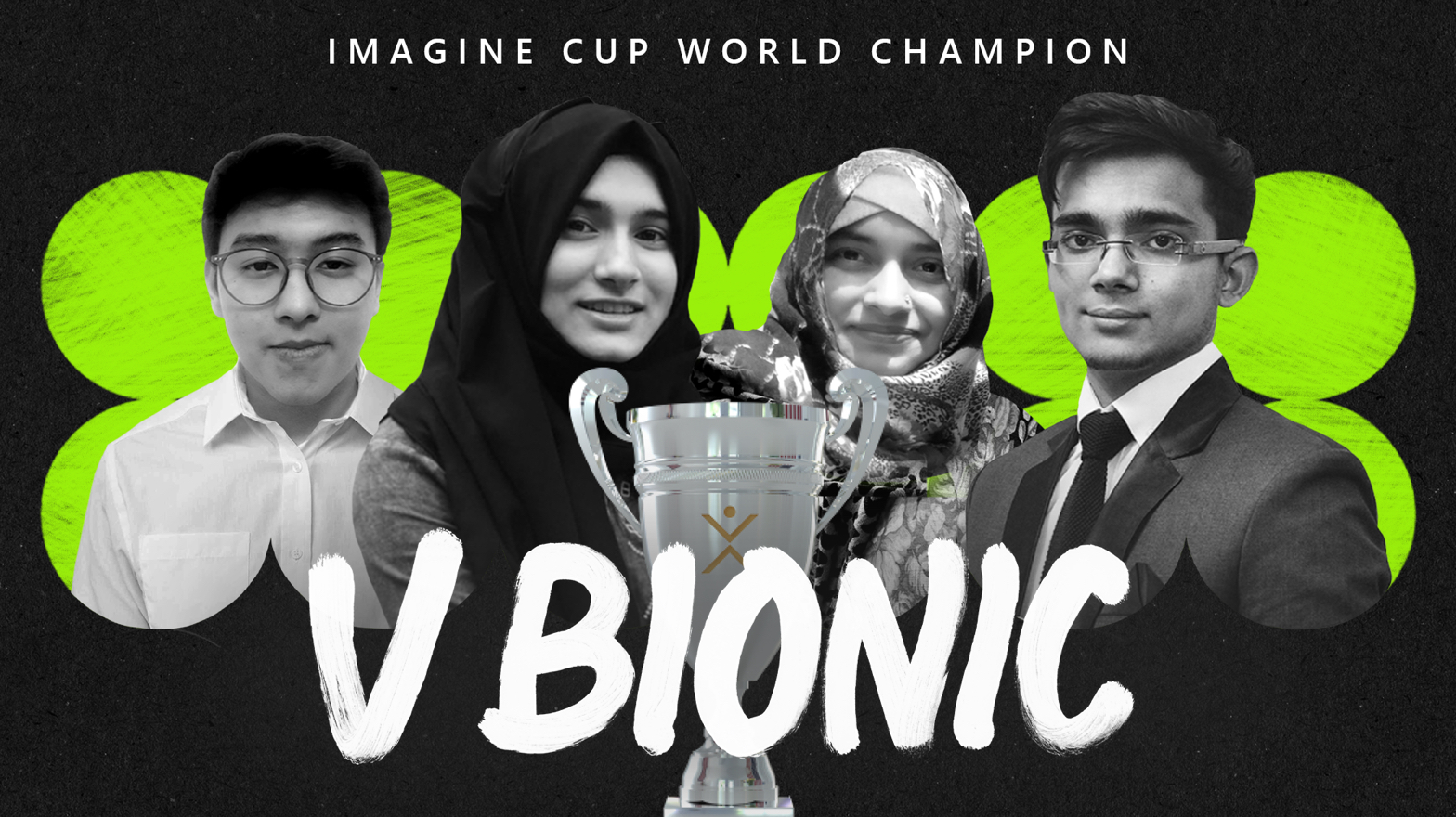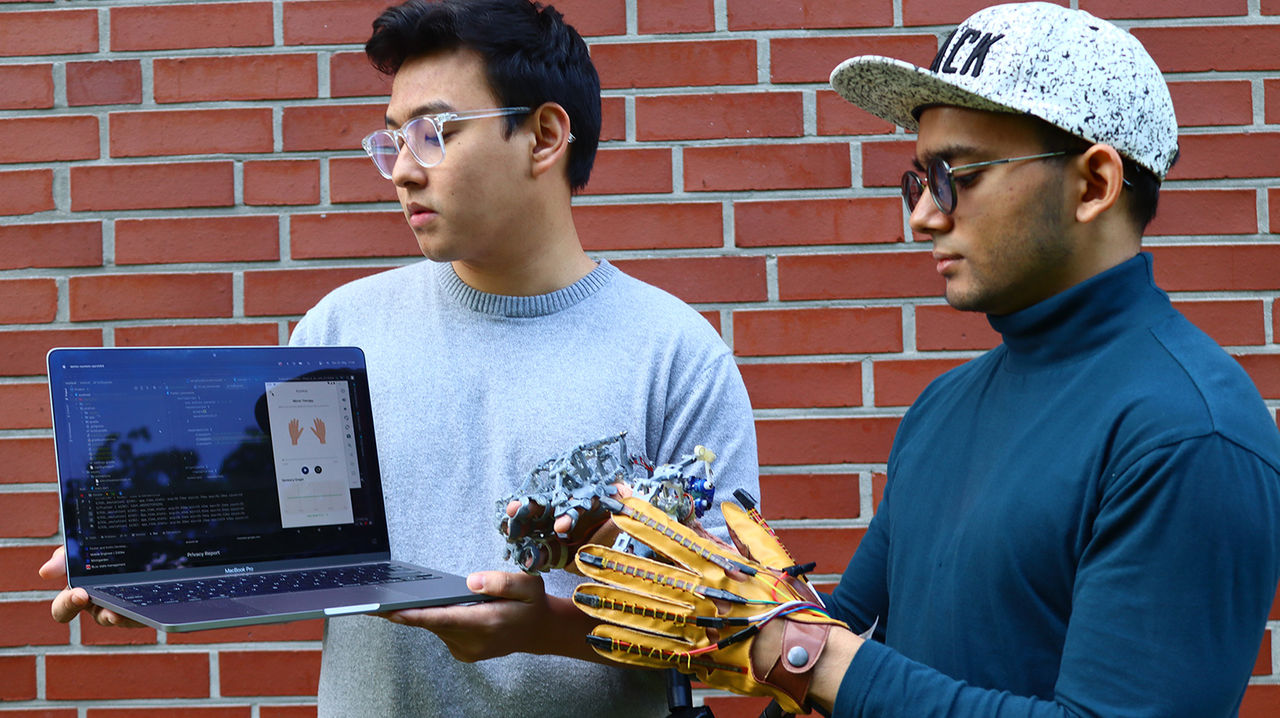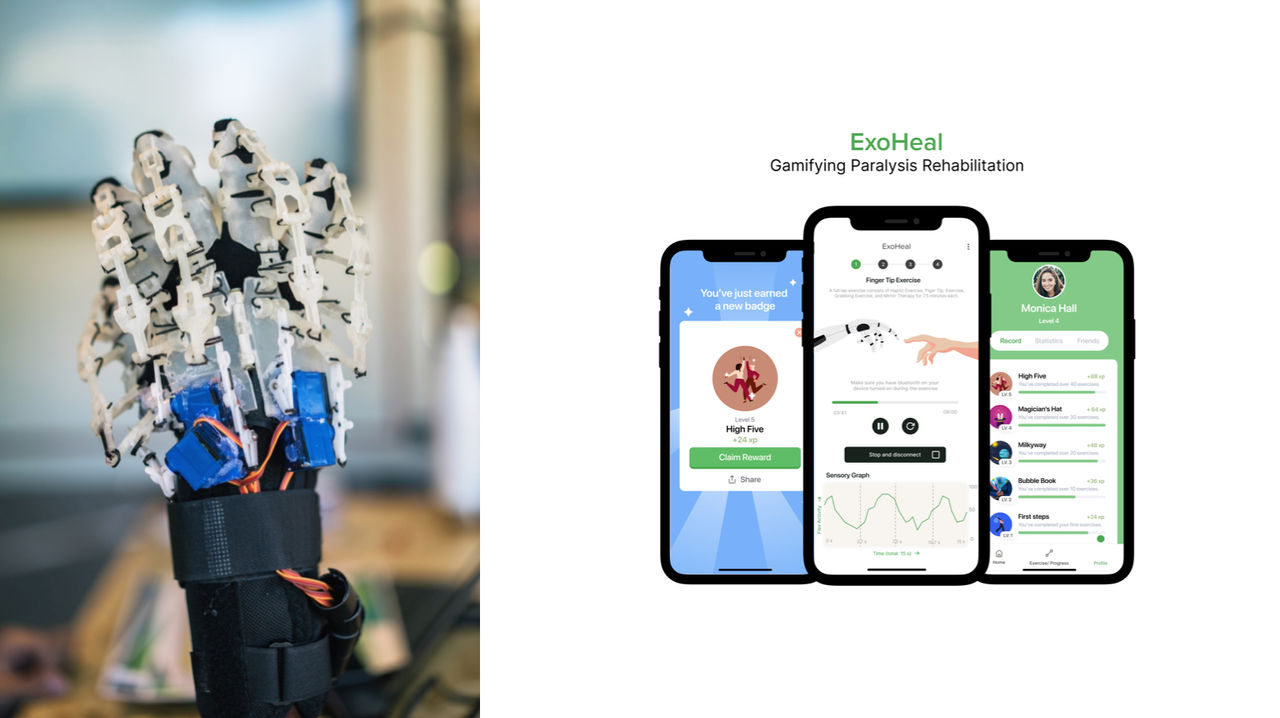Imagine Cup Champions Use Azure to Advance Robotic Rehab
Imagine Cup winners Team V Bionic share how they are using Azure IOT Hub and the inspiration behind their project.

Tens of thousands of students entered this year's Imagine Cup competition. Of those, 48 teams advanced to the World Finals, 3 teams moved on to the World Championships, and 1 team was declared the winner in May. The 2022 World Championship is V Bionic and their project ExoHeal: an affordable and accessible robotic exoskeleton that helps patients recover faster from paralysis. Team V Bionic takes home the grand prize of USD 100,000, USD 50,000 Azure credits, and a mentoring session with Microsoft Chairman and CEO, Satya Nadella. The winners plan to launch ExoHeal in late 2022 and add support for additional body rehabilitation by 2024.
Judging this year's championship was not easy! Linda Lian, CEO/Founder of the Common Room, Kat Norton aka Miss Excel, and our own Phil Spencer were up for the task. After the competition Phil said "There's a real special intersection of technology and the human condition, and it's so inspiring to see teams putting human needs first—seeing how technology can make the lives of so many people better. It's something that drives me, it drives our teams, and it's great to see the next generation coming with that same focus. Really inspiring."
In reflecting on the Imagine Cup process, the team shared that they enjoyed the Q&A sessions with the judges because that is where they could really see the passion behind each project. Zain Samdani, the original ExoHeal creator, elaborates that "the two other teams that we were competing against, they [also] have such potential to have a massive impact. This entire process has felt wholesome—we're all here, we are learning from each other, and we are trying to make the world a better place."
For the first time in Imagine Cup history, you can relive the excitement of the 2022 Imagine Cup World Championship on ESPN3 from July 14! (US only). What follows here is the inspiring story of Team V Bionic.
Zain Samdani, a first-year robotics and artificial intelligence student from Saudi Arabia studying in Germany at Jacobs University, was already working on a project with prosthetic hands when he met a distant uncle on a summer vacation to India in August of 2015. Zain was shocked to learn that his uncle was paralyzed. "[He was] unable to even lift a spoon, and I empathized with how challenging it would be to require assistance with almost every single task throughout his day."
From that moment, Zain wanted to do something to help his uncle.

Transportation to the doctors in Hyderabad from his home in the village of Mancherial was costly and time consuming, so Zain spoke with physiotherapists to see if there were other, more flexible rehab options. Although devices that can significantly speed up rehab do exist, they are limited to specific treatment centers and the cost of treatment is very high. Zain decided to leverage his prosthetic hands project to develop an affordable device to assist the more than 200 million people that are paralyzed – and that is where ExoHeal began.
Through competitions and events, Zain gradually encountered more people who were similarly motivated by the experiences of paralyzed family and friends. During a hackathon in 2021, he met Ramin Udash, 19, a Nepalese first-year computer science and robotics classmate. The two developed a social media app focused on building meaningful connections, and, as Ramin put it, "bonded over a shared ideology of using technology to better lives." When Zain shared his ideas about ExoHeal, Ramin agreed to apply his mobile app development skills to the project.
They rounded out their team with two women from Saudi Arabia: Faria Zubair and Asfia Zubair. Faria, who joined to lead the design of the device, is pursuing Bachelor of Art and Associate of Business Administration degrees at University of the People and is passionate about fashion design and technology. She came up with the sleek exoskeleton design and developed a new mechanical system to simplify the electronics, making the glove feel like a second skin.
Asfia is Team V Bionic's patient coordinator. She is currently studying at University of the People for her Master of Education, specializing in physical disabilities and their related psychological trauma. Because patients must often overcome mental barriers to begin therapy, Asfia focuses on the part of the app that helps patients learn that their hands are usable—even if they have been unused since paralysis—and assist them to overcome that initial resistance to therapy, in part by helping her patients remain hopeful and positive throughout their treatment.
The current prototype has been developed to address hand paralysis of a single side of the body. The patient wears a sensory glove on their functional hand, allowing each movement of the functional hand to be reproduced the robotic hand. This type of mirroring is scientifically proven to accelerate recovery because visualizing the movements helps the brain form new neural pathways. Typically, a patient needs an expert to guide their movements while using robotic gloves. That's where ExoHeal comes in: its mobile app guides patients through exercises assigned by their doctor, measures their movements and sensations, records their progress over time, and shares that data with their doctor.

In part because Zain has firsthand experience with both the tedium and necessity of rehabilitation therapy (as a child, he had to retrain his eyes to track and focus following surgery to address recurring bouts of split vision), he and his team understand the crucial role that a positive attitude plays in recovery. To help motivate patients to rehab regularly, Team Bionic V included gamification elements in the ExoHeal app.
By breaking down the exercises into small challenges and adding points, levels, badges, and increasing rewards, the app makes the therapy more approachable and forms a psychological link in the brain between recovery and rewards. It rewards users with experience points based on the amount of time spent using the device and on the frequency with which they complete their exercises. (In countries like Germany, insurance companies award points for physical activities to encourage healthier living, and a future goal of ExoHeal is to tie into that healthcare ecosystem and allow German users to apply their experience points to their insurance program.)
The team also added game-like rendering to the app, which visually displays the movements and progress on screen. By displaying the paralyzed hand movements through an animation, the end goal is reinforced and helps the patient's brain adapt more quickly. In addition, rehabilitation progress is often gradual, and sometimes patients can't see the movements as they do the exercises, but ExoHeal detects the smallest movements of the paralyzed hand and then depicts them in the app so that a patient can see movement occurring and be encouraged to continue therapy.
ExoHeal also has an assistive function. Because it incorporates robotics, patients can complete hand movements with robotic assistance that they normally can't complete on their own. Being able to pick up objects and perform daily tasks helps boost patient morale, and not being tied to a desk or monitor to complete their exercises lets them move around and complete tasks that are important to them while doing therapy.
To collect data from the glove using IoT hub, ExoHeal uses Azure. The resulting data can be rendered in the mobile app and shared with doctors. Says Ramin, "Azure makes our whole system more accessible to people so that they can more easily use it in their daily lives." Although this was the team's first time using Azure, he adds that, "in terms of usability, it was very easy given the documentation and package were readily available for us through the Azure for Students program."
ExoHeal also uses Azure to analyze the data it collects and displays progress to the patient and their doctor. The doctor can then adjust the therapy schedule or suggest changes in the exercises. The end goal of the team is to incorporate Azure digital twins and bring ExoHeal to the metaverse. Within a virtual world, paralyzed hand movements could be rendered even more realistically, helping build those new neural pathways through mirroring and accelerating therapy progress. The team hopes to add additional game elements to the experience in virtual worlds.
"Through the competition we have been given access to invaluable resources such as mentorship, queries resolution, Azure technologies," Zain says, "which have been tremendously beneficial in speeding up the development process and helping us solidify our go to market strategy." The team is using the cash prize to build a production-ready model in preparation for clinical trials and manufacturing and assembly. They plan to use their Azure credits to add machine learning to further refine the amount of robotic assistance applied based on the patient's progress.
The news media often focus on robotics as a replacement for the limbs of amputees, but the students hope their example, combined with the global platform of Imagine Cup, will encourage more students to explore this application of robotics. "Imagine Cup provided the unique opportunity to take up the challenge and leap towards the digitalization of rehabilitation therapy," says Zain.
Congratulations, Team V Bionic!
More about Imagine Cup
This year marked the 20th anniversary of the Imagine Cup, Microsoft's premier student technology and innovation competition. Students from around the world form teams to create world-changing projects in one of four competition categories: Earth, Education, Health, and Lifestyle. 48 teams were selected to continue to the World Finals, where they pitched their ideas to expert judges, demo their tech, and engage in a question-and-answer session. Projects will be judged on their innovative use of Azure technology, accessibility and inclusion, and marketability as a business idea. Three teams moved on to the World Championship, where one was deemed the 2022 Imagine Cup champion. We are very excited that this year there were six teams competing in the World Finals that had gaming-related projects.
More about Azure and Gaming
Accelerate your game development in the cloud with the ID@Azure program. ID@Azure empowers independent studios and start-up game developers to take full advantage of the cloud to build and grow their games. By joining the program, you get free access to developer tools and support from industry experts. Find out more at www.azure.com/ID.
